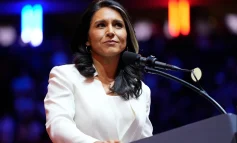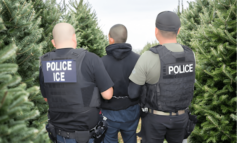
|
| Pearce, who took over as president of the state Senate this year, has been in office for 10 years. Like many of his constituents, he is a member of the Mormon church. |
PHOENIX — A bipartisan effort to recall conservative Arizona
state Senator Russell Pearce, known for his tough stance on illegal
immigration, could signal a shift in the political climate in Arizona, even if
it doesn’t result in Pearce leaving office.
Hundreds of people from the group Citizens for a Better
Arizona gathered outside the Secretary of State’s office on Tuesday to deliver
18,315 signatures in support of the recall.
Once the signatures are certifed, Pearce will automatically
be recalled and will face a special election to keep his job. That could happen
in November.
Only 7,756 signatures are required to force the new
election, but the group’s cofounder, Randy Parraz, said activists wanted to
make a political statement by surpassing the 17,553 votes Pearce received in
November 2010.
If the campaign succeeds, it would be the first time in
Arizona history that a politician faced a recall election, according to the
Secretary of State. (Republican Governor Evan Mecham was recalled for misusing
state funds in 1988 but was impeached and removed from office before the
election took place.)
A recall would be even more noteworthy in light of Pearce’s
extremely conservative District 18, which covers most of western and central
Mesa and small portions of the Salt River Pima-Maricopa Indian Community.
“It is remarkable, given the district where he comes
from is heavily Republican,” said Rodolfo Espino, a political science
professor at Arizona State University in Tempe.
Espino said the recall campaign has been successful because
it hasn’t focused on immigration, but has included Pearce’s overall political
performance.
Pearce, who took over as president of the state Senate this
year, has been in office for 10 years. Like many of his constituents, he is a
member of the Mormon church.
He first gained national notoriety as a hardliner against
illegal immigration for his support of Prop. 200, a ballot initiative to deny
public benefits to undocumented immigrants, which was passed by state voters in
2004.
Pearce later was the main force behind a law, upheld by the
U.S. Supreme Court on May 27, to sanction businesses that hired undocumented
workers. Most recently, he garnered international attention for being the
“architect” of SB 1070. The law, which has been partially blocked in
the courts, would allow local police to incarcerate suspected undocumented
immigrants.
In 2008 and 2010, Pearce was re-elected with close to 56
percent of the vote.
Parraz says Pearce’s support for SB 1070, as well as his
attempt to change the 14th Amendment of the Constitution to deny birthright
citizenship to the children of undocumented immigrants, is only part of the
reason voters have supported the recall campaign.
Other reasons cited on the Citizens for a Better Arizona
website are Pearce’s political performance on such issues as health care (he
helped defund the state public health care system) and public education (he
supported major cuts).
Parraz said that the group hopes to send the message that
Pearce is out of sync with what voters want.
“We don’t talk about the issue of immigration because
there’s so much more,” said Brenda Rascón, who lives in Pearce’s district
and who has been circulating petitions for his recall since February.
“There are people in his own district (who) are hurting economically, and
he is pursuing this agenda that is economically disastrous,” she said.
Rascon said that in conversations with voters, some
supported his immigration views, but were disappointed with his failure to
disclose that he had received numerous free trips to out-of-state college
football games from the nonprofit organization Fiesta Bowl. While he has denied
any wrongdoing, Pearce was among several legislators who amended their
financial disclosure reports to list the trips that had not been reported.
Two weeks ago, Pearce was also the subject of a special news
report by the Phoenix-based Fox News affiliate, KTVK-3TV, that questioned his
ties to neo-Nazi J.T. Ready (previously reported by the weekly Phoenix News
Times). Pearce denied knowing about Ready’s connections to the movement, and
claimed that he cut ties with him once he found out.
The senator wasn’t available for an interview with NAM. His
spokesperson said he wasn’t “as a general rule” commenting on the
recall.
But during a “Fight the Recall” rally that was
attended by Maricopa County Sheriff Joe Arpaio, also known for his tough stance
on immigration, Pearce told a Phoenix television station that he takes the
recall campaign seriously.
“You take everything seriously. People know who these
folks are. They’ve tried it before,” Pearce said. “They’re simply
open-border anarchists who have no respect for the rule of law. We’ll deal with
it.”
Chad Snow, cofounder of Citizens for a Better Arizona, who
is a Republican and Mormon, said the grassroots group has the support of a
number of Republicans and members from Pearce’s church. Activists also include
people on different sides of SB 1070, he added.
Snow said that the GOP is conflicted over politicians such
as Pearce, who are perceived as ideologically extreme and divisive.
That internal division was evident during the last
legislative session, when at least five anti-immigrant measures pushed by
Pearce, including one to deny birthright citizenship, were defeated with the
support of at least 12 Republicans.
If Citizens for a Better Arizona turns in a sufficient
number of valid signatures, Republican Governor Jan Brewer will have to call
for a special election. Pearce could choose to participate or not. The election
could happen this November or next March, depending on how much time the
Secretary of State’s office and the Maricopa County Recorder’s Office take to
verify the signatures.
“Even if he runs for re-election and wins, he will
always have that stigma [of the recall],” Snow said.





Leave a Reply